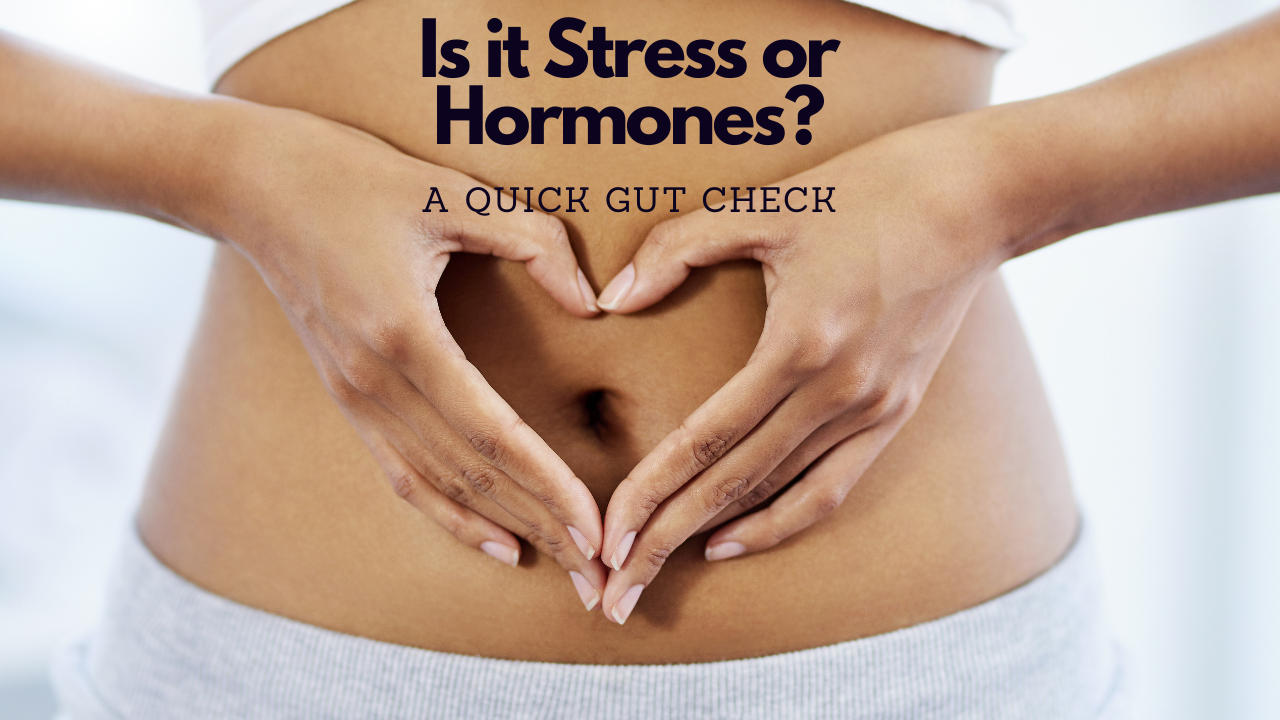Is it Stress or Hormones? A Quick Gut Check
Sep 09, 2025
You’re exhausted but can’t sleep. Your mood swings from calm to snappy in minutes. Some days, you feel bloated, anxious, and wired all at once. The question is… is it stress or is it hormones?
For midlife women, the answer is often both. Stress and hormonal changes are deeply connected — especially during perimenopause and menopause. And one of the most overlooked places where this shows up? Your gut.
How Stress Affects the Gut
When you’re stressed, your body produces more cortisol, the stress hormone. High cortisol can:
- Disrupt digestion (leading to bloating, cramps, or constipation)
- Alter gut bacteria (making you more sensitive to certain foods)
- Trigger cravings for sugar or comfort carbs
- Disturb sleep, which further stresses the gut
In short, stress doesn’t just live in your mind, it shows up in your belly.
How Hormones Affect the Gut
During perimenopause and menopause, estrogen and progesterone naturally fluctuate and decline. These shifts can:
- Slow down digestion, leading to bloating and discomfort
- Change how your body processes carbs and fats
- Increase gut sensitivity, especially around your cycle or hot flashes
- Affect serotonin (much of which is made in the gut), influencing mood and digestion
That’s why the gut often feels like ground zero during hormonal transitions.
The Stress-Hormone Connection
Here’s where things get tricky: stress and hormones fuel each other. High cortisol can worsen hormonal imbalances, while shifting estrogen and progesterone levels can make you more vulnerable to stress. And your gut is caught in the middle.
Think of your gut as your body’s “check engine light.” If you’re constantly bloated, constipated, craving sugar, or struggling with mood swings, it may be your body’s way of saying: pause, I need balance.
A Quick Gut Check You Can Try
When you’re unsure if it’s stress, hormones, or both try this quick self-check:
- Notice your breath : Is it shallow or tight? Stress is often reflected in how we breathe.
- Notice your digestion : Are you bloated, constipated, or craving sugar? Hormones and stress both show up here.
- Notice your energy : Is it up and down all day? Cortisol spikes and hormone dips often cause that rollercoaster feeling.
- Notice your mood : Quick irritability, anxiety, or brain fog can signal imbalance.
If more than one of these is true, it’s likely a combination of stress and hormones affecting your gut.
Simple Reset Strategies
- Practice daily breathwork or meditation to lower cortisol
- Prioritize protein and fiber at meals to stabilize blood sugar
- Stay hydrated : even mild dehydration can spike cortisol
- Add fermented foods (like yogurt or sauerkraut) to support gut health
- Get quality sleep : your hormones repair while you rest
The Takeaway
For midlife women, stress and hormones are closely linked and the gut is where they often collide. Instead of asking “Is it stress or hormones?”, the better question might be: How can I support both, starting with my gut?
Your gut is more than digestion : it’s a powerful guide to how balanced (or unbalanced) your body really is. And by tuning in, you can take small steps that bring both your stress and hormones back into harmony.
Stay connected with news and updates.
Join our mailing list to receive the latest news and updates from our team.
Don't worry, your information will not be shared.
We hate SPAM. We will never sell your information, for any reason.



